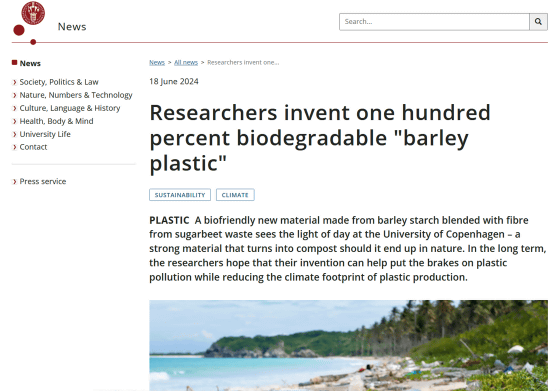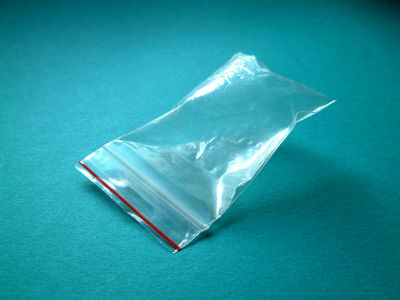Researchers invent 'barley plastic' that is 100% biodegradable and can be used for food packaging, etc.; prototype could be produced within five years

Some people may know about '
Researchers invent one hundred percent biodegradable 'barley plastic' – University of Copenhagen
https://news.ku.dk/all_news/2024/06/researchers-invent-one-hundred-percent-biodegradable-barley-plastic/

Plastics are durable, malleable , and inexpensive to manufacture, so they are used in everything from food packaging to clothing, aircraft parts, and medical equipment. However, plastics have the disadvantage that they are difficult to decompose naturally and are difficult to recycle, and environmental pollution such as microplastics has become a social problem.
Despite progress in recent years in efforts to recycle plastic, only 9% of plastic is recycled worldwide; the rest is incinerated, dumped into nature or dumped into huge plastic landfills.
Some people may think that bioplastics derived from plants will decompose naturally. However, common types of bioplastics do not decompose easily even when dumped into the natural environment, and some of them continue to pollute the environment as microplastics. In fact, special facilities are required to decompose bioplastics, and even then, only a small portion can be recycled, and the rest is discarded.

To solve the problems associated with plastics, a research team led by
'Humanity has a huge problem with plastic waste, and recycling doesn't seem to be the answer,' says Brenow. 'So we've developed a new type of bioplastic that's stronger than current bioplastics and can withstand water. At the same time, our material is 100% biodegradable, and even if it's thrown away somewhere other than the trash, it will be converted by microorganisms into compost.'
The invented bioplastic is composed of several naturally decomposable substances, the main raw materials of which are amylose , which is found in plant starch, and cellulose , the main component of plant fiber. Amylose can be extracted from many crops, including corn, potato, wheat, and barley, but the research team established a spin-off company to breed 'barley that produces pure amylose.' Pure amylose is less likely to become paste-like when it interacts with water than regular starch , making it an important raw material for making water-resistant bioplastics.
Cellulose is also found in all plants, and the research team used nanocellulose made from local sugar industry waste. Nanocellulose is only 1/1000th the thickness of linen or cotton fibers, which increases the mechanical strength of the new bioplastic. 'Amylose and cellulose form long, strong molecular chains. By combining them, we create a durable and flexible material that could potentially be used in shopping bags and food packaging that is currently wrapped in plastic,' said Brenow.
The new bioplastics are made by dissolving and mixing the raw materials in water or by heating them under pressure. The resulting tiny pellets can then be processed and molded into the desired shape. So far, the team has only produced prototypes in the lab, but plants that produce amylose-rich starch are grown all over the world, so it should be relatively easy to start production in Denmark and elsewhere.

The research team is currently applying for a patent for the new barley plastic, which, if approved, will pave the way for the production of new bioplastics. Brenau argues that efficient recycling of plastics is technically and socially difficult and unlikely to succeed, so instead of recycling, it is important to develop new materials that do not pollute the earth.
Brenau and his team are already working with two Danish packaging companies to develop prototypes for food packaging using barley bioplastics. 'We're now at the point where we can begin full-scale production of prototypes in collaboration with research teams and companies,' Brenau said. 'We expect to have prototypes for a range of soft and hard packaging, including trays, bottles and bags, developed within the next one to five years.'
Related Posts:
in Science, Posted by log1h_ik







